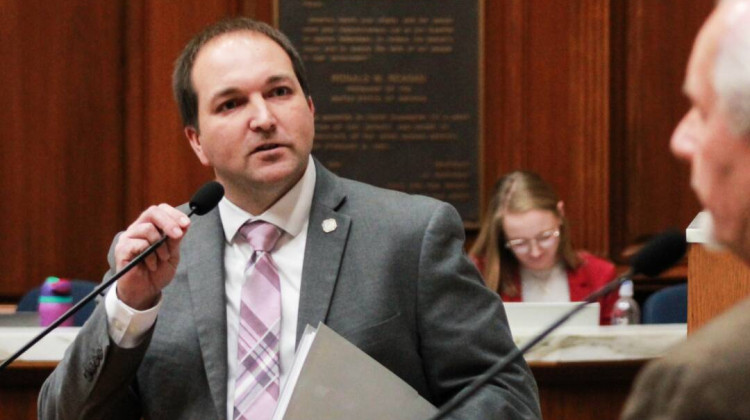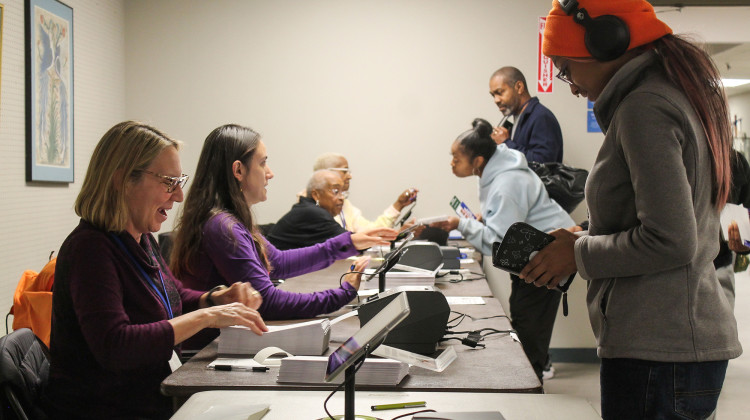To strike a bargain with a politically powerful ally, Indianapolis Public Schools leaders voted to shrink — again — the district’s multimillion-dollar funding request to taxpayers.
The new request amounts to $220 million over eight years. And this time, the proposal will be supported by the business group, which could play a pivotal role in helping the district win over voters.
The new request comes after a week of intense negotiations between the district and the chamber, which threatened to oppose the district’s operating referendum. Chamber officials had presented a plan that asked taxpayers for $100 million along with massive cuts that they said would make Indianapolis Public Schools operate more efficiently. The district then countered that $315 million was the bare minimum needed to serve students.
The school board voted 5-0 in favor of the reduced request at its meeting Tuesday night. Board members Mary Ann Sullivan, Venita Moore, Michael O’Connor, Elizabeth Gore, and Diane Arnold supported the measure. Board members Dorene Rodriguez Hoops and Kelly Bentley were absent. The plan will appear on the November ballot with an additional tax measure to raise $52 million for building improvements.
District leaders have been collaborating with the chamber for more than four months to craft a slimmed down request after their first proposal garnered little community support. The agreement approved Tuesday represents a compromise between the chamber’s plan and the district’s request.
The reduced request was clearly a bitter pill for many of the school board members to swallow.
Moore said that the students in Indianapolis Public Schools deserve better than the district has been able to provide. The chamber has promised that if the funds are not enough to ensure a high-quality education, the business group will work with the district to pursue another referendum, she said.
Children of color represent more than 70 percent of the school district, said Moore, who is black. “We deserve a quality education,” she said. “Our children do not deserve substandard education, books, instruments, or tools.”
In a prepared statement, Sullivan raised several concerns about the impact on the district of the smaller proposal, which she said was based on assumptions that are “unrealistic, politically naive, and potentially damaging to our community.”
Sullivan said the cuts proposed in the chamber’s report would never be accepted in suburban communities with affluent families like Carmel, Zionsville, and Brownsburg.
“IPS cannot intentionally build or allow ourselves to be satisfied running a system of second- or third-class public schools simply because we primarily serve low-income families and students of color,” she said.
The $220 million request that the groups settled on includes a raise in pay for teachers, but the district is not committing to a specific increase. There will also be about $95 million in cuts, including $31 million in transportation, $47 million in facilities, and $17 million in food service, according to the district.
For now, budgets for individual schools will be “business as usual,” said Superintendent Lewis Ferebee. But, ultimately, the district may need to close more than a dozen schools as part of the plan, he said.
“It will be a complex process,” Ferebee said. Before the district makes decisions on what schools to close, he added, the board members will have to “consider the impact on neighborhoods, the impact on education outcomes.”
The plan will result in a slower process for school closings, a longer phase-in of transportation changes, and a slower pace for reducing the number of teachers compared to the chamber’s initial proposal, according to the business group.
Indy Chamber CEO Michael Huber said the district must work through “thorny issues” going forward. But he was optimistic about the plan.
“We feel strongly that where we’ve landed really balances the impacts of where you are trying to take the district, and the positive changes you are making, and also the impact with quality of life on our city,” he told the board.
The chamber has not yet determined whether to actively campaign for the referendum, but the group will vocally back the tax measure, said Mark Fisher, chief policy officer for the Indy Chamber.
“We are going to be offering our full-throated support — our full support for the referendum,” he said. “Hopefully we will be able to build a broader community consensus on the increased funding for IPS.”
The agreement entwines the district with the chamber for the long haul. The business group will help raise private funds for two staff members who would be dedicated to pushing for sweeping changes that the chamber recommended in its report earlier this month, Fisher said.
“Making sure that they are implementing at an appropriate level and speed is going to be key,” said Fisher.
The new plan is less than a third of the size of the initial proposal that the district made seven months ago, which would have raised $736 million over eight years for operating expenses. Superintendent Lewis Ferebee said last week that the district may need to return to voters for more money if the first request does not raise enough.
But while district officials clearly support a larger request, there has been significant pressure for them to come to an agreement with the chamber.
Chalkbeat is a nonprofit news site covering educational change in public schools.
 DONATE
DONATE








 Support WFYI. We can't do it without you.
Support WFYI. We can't do it without you.